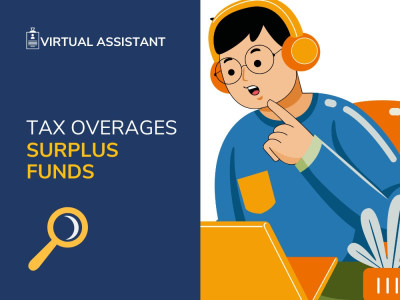All Categories
Featured
Table of Contents
Many of those home owners really did not even understand what overages were or that they were even owed any kind of surplus funds at all. When a homeowner is incapable to pay home taxes on their home, they might lose their home in what is recognized as a tax obligation sale public auction or a sheriff's sale.
At a tax obligation sale public auction, properties are marketed to the greatest bidder, nevertheless, in some instances, a residential property might cost even more than what was owed to the county, which causes what are called excess funds or tax sale overages. Tax sale excess are the additional cash left over when a foreclosed property is cost a tax sale auction for greater than the amount of back taxes owed on the property.
If the residential or commercial property costs even more than the opening bid, then overages will be produced. What a lot of property owners do not recognize is that lots of states do not enable regions to maintain this added money for themselves. Some state laws dictate that excess funds can just be asserted by a couple of events - consisting of the individual who owed taxes on the residential property at the time of the sale.
If the previous residential property owner owes $1,000.00 in back tax obligations, and the building costs $100,000.00 at public auction, after that the regulation specifies that the previous residential property proprietor is owed the difference of $99,000.00. The area does not reach maintain unclaimed tax obligation overages unless the funds are still not claimed after 5 years.
Best-In-Class Tax And Mortgage Overages Training Tax And Mortgage Overages
The notice will normally be sent by mail to the address of the home that was sold, but since the previous property proprietor no longer lives at that address, they typically do not receive this notice unless their mail was being sent. If you remain in this situation, don't let the federal government keep money that you are qualified to.

Every once in a while, I hear talk regarding a "secret brand-new chance" in business of (a.k.a, "excess earnings," "overbids," "tax sale surpluses," and so on). If you're completely unknown with this principle, I want to offer you a quick introduction of what's going on right here. When a homeowner stops paying their property taxes, the neighborhood town (i.e., the area) will wait for a time before they seize the home in foreclosure and offer it at their annual tax sale auction.
uses a comparable design to recoup its lost tax revenue by selling properties (either tax obligation actions or tax liens) at a yearly tax obligation sale. The info in this post can be influenced by many special variables. Constantly seek advice from a certified legal expert before acting. Suppose you own a property worth $100,000.
Efficient Bob Diamond Overages Learning Best States For Tax Overages

At the time of repossession, you owe regarding to the area. A couple of months later, the region brings this property to their annual tax sale. Right here, they sell your home (together with lots of other delinquent residential or commercial properties) to the highest possible bidderall to recover their shed tax obligation earnings on each parcel.
Most of the financiers bidding on your building are totally conscious of this, too. In many cases, homes like yours will certainly obtain proposals FAR beyond the quantity of back tax obligations really owed.
Get this: the county just required $18,000 out of this residential property. The margin in between the $18,000 they required and the $40,000 they obtained is understood as "excess earnings" (i.e., "tax obligation sales overage," "overbid," "surplus," and so on). Lots of states have laws that ban the region from keeping the excess payment for these buildings.
The area has regulations in area where these excess earnings can be asserted by their rightful owner, typically for a designated duration (which differs from one state to another). And that exactly is the "rightful owner" of this cash? In many cases, it's YOU. That's! If you lost your property to tax foreclosure because you owed taxesand if that residential property subsequently cost the tax sale public auction for over this amountyou might feasibly go and collect the distinction.
Dependable Overages Surplus Funds System Real Estate Overages
This includes verifying you were the prior owner, completing some documents, and awaiting the funds to be supplied. For the ordinary individual that paid complete market value for their property, this strategy does not make much feeling. If you have a severe amount of cash money invested right into a home, there's method as well a lot on the line to just "let it go" on the off-chance that you can bleed some extra squander of it.
With the investing approach I use, I could get buildings complimentary and clear for pennies on the buck. When you can purchase a building for an unbelievably inexpensive cost AND you know it's worth significantly more than you paid for it, it may really well make feeling for you to "roll the dice" and try to accumulate the excess proceeds that the tax foreclosure and public auction process create.
Best Bob Diamond Tax Overages Blueprint Course Bob Diamond Tax Overages Blueprint
While it can definitely turn out comparable to the means I have actually described it above, there are additionally a few drawbacks to the excess earnings approach you really should understand. How to Recover Tax Sale Overages. While it depends significantly on the qualities of the home, it is (and in many cases, likely) that there will certainly be no excess proceeds generated at the tax sale auction
Or perhaps the county doesn't create much public passion in their public auctions. Either method, if you're purchasing a building with the of allowing it go to tax repossession so you can accumulate your excess profits, what if that cash never ever comes through?
The very first time I pursued this approach in my home state, I was told that I really did not have the choice of declaring the excess funds that were produced from the sale of my propertybecause my state didn't permit it (Mortgage Foreclosure Overages). In states similar to this, when they produce a tax sale excess at a public auction, They simply keep it! If you're believing about utilizing this approach in your organization, you'll intend to think lengthy and tough concerning where you're doing business and whether their laws and statutes will even permit you to do it
Market-Leading Tax Auction Overages Course Bob Diamond Tax Sale Overages
I did my best to offer the correct answer for each state over, but I would certainly advise that you prior to proceeding with the assumption that I'm 100% proper. Bear in mind, I am not a lawyer or a certified public accountant and I am not trying to provide expert legal or tax suggestions. Talk to your lawyer or CPA before you act upon this details.
Table of Contents
Latest Posts
Delinquent Tax Properties Near Me
Investing Tax Lien
Excess Proceeds
More
Latest Posts
Delinquent Tax Properties Near Me
Investing Tax Lien
Excess Proceeds